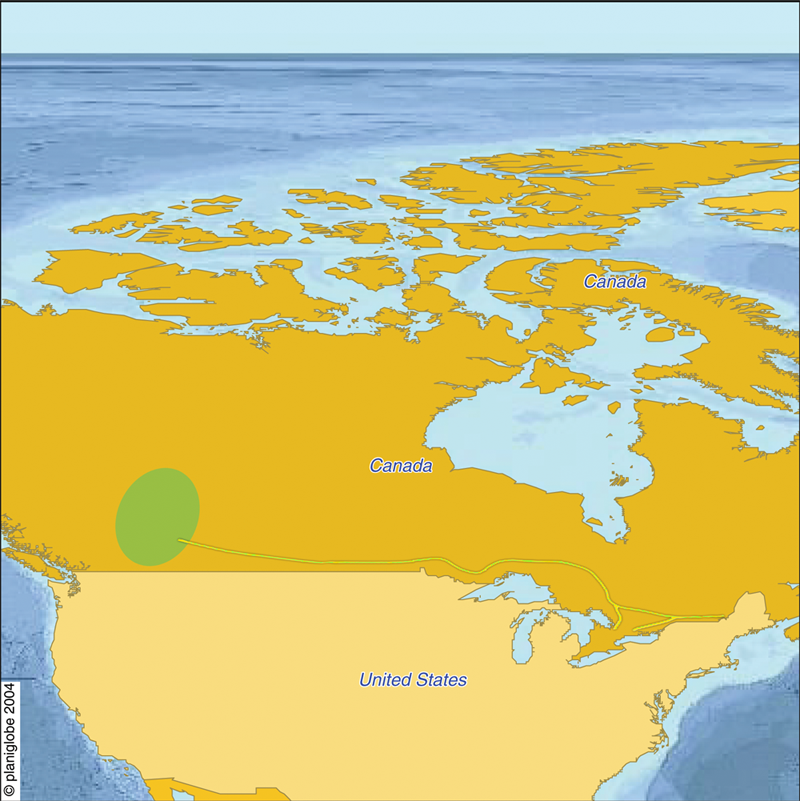Canada Pipeline
February 24, 2020
Prime Minister of Canada, Justin Trudeau, gave permission to Coastal GasLink, a natural gas construction and extraction firm, to build a pipeline through the land of the Wet’suwet’en people. The Wet’suwet’en are indigenous people who have claimed the 22,0002 km area that makes up their land for hundreds of years. This has caused major demonstrations and outrage.
Recently, protesters halted traffic on the U.S.-Canada border bridge in Niagara Falls, Ontario. Around two-hundred protesters halted traffic at Rainbow International Bridge on the 16th. “Rail lines across Canada have been paralysed for almost two weeks after being blockaded by indigenous protesters and their supporters,” according to the BBC article, “The Wet’suwet’en conflict disrupting Canada’s rail system.” According to an article by The Guardian article “Canada: protests go mainstream as support for Wet’suwet’en pipeline fight widens,” “‘Trudeau has gone to the United Nations to shed tears about the history of Canada’s relationship with indigenous people,’ said [Dr. Karla] Tait. ‘And on the other hand, he’s essentially authorizing the use of force against our unarmed people for upholding our rights.’” The article also states, “Climate action groups have also taken up the cause of the Wet’suwet’en, seeing their fight as part of a broader one against resource extraction projects in the country.”
A recent article from The Guardian talks about how another blockade has put pressure on Prime Minister Justin Trudeau, someone who claims that he wants to improve relations with indigenous communities. The article states, “New train blockade piles pressure on Trudeau in Wet’suwet’en pipeline fight,” states, “The opposition Conservative party says the federal government should send in police to clear the blockades, which are also hitting Quebec, Canada’s second most populous province.”
Things are getting very tense in Canada right now. An Al-Jazeera article, called Canada at “’tipping point’ over Wet’suwet’en land dispute,” says that Chief Wilton Littlechild, the former head of the Truth and Reconciliation Commission (TRC) of Canada, stated, “‘This is a tipping point for Canada and it illustrates a real need for reconciliation to begin where it hasn’t and to continue where it has.’”
Some people are critical of how Trudeau is handling the problem. The article states, “These illegal blockades are trying to shut down Canada, and there’s people losing their jobs, blue-collar people, vulnerable people, propane storage [is] running short in hospitals in Quebec,’ said Alberta Premier Jason Kenney.” The article also states, “Canada’s opposition leader Andrew Scheer demanded Trudeau remove the ‘radical activists’ who are holding the country ‘economic hostage’.”
Some people show strong support with the indigenous people. Sylvia McAdam, a Cree lawyer and professor at the University of Windsor, stated, “I think today we’re reaching a boiling point where Indigenous people are so tired of the racism, they’re tired of colonisation, they’re tired of protecting and defending (rights and land).”
McAdam explained talked more about the situation in the article. The article states, “‘I hope that the colonial state called Canada will make fundamental changes in how they work with Indigenous Peoples,’ she said. ‘That means we get our lands back, honour the treaties, none of the lands are ceded or surrendered. If that doesn’t happen you’re [Canada] going to condemn the next generation [my grandchildren] to poverty and you’re going to leave behind a very angry generation of young people.’”
Based on the facts of the matter, I personally hope that those resisting will be successful and hope that the “fundamental changes” that McAdam talked about will happen.
